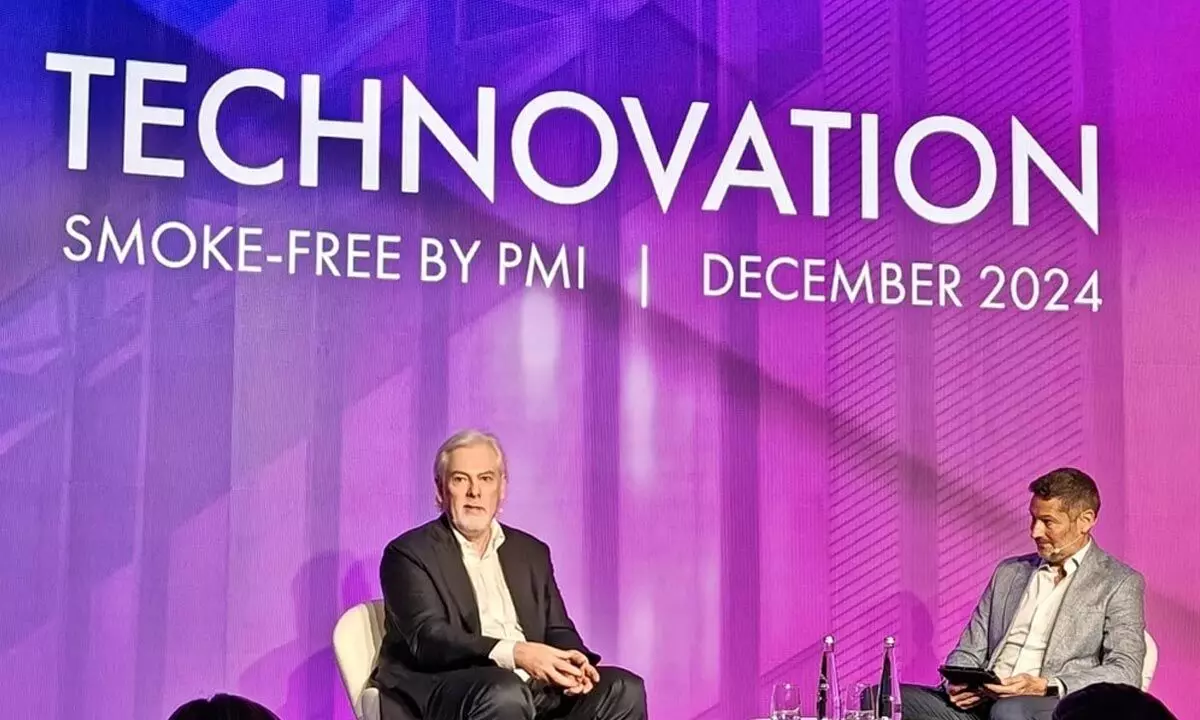Live
- KSRTC rolls out 20 ‘Ambaari Utsav’ sleeper buses
- Consecutive Olympic medals, Sreejesh, HIL make headlines
- Indian athletics: Neeraj stands tall
- YSRCP blamed for delay in bypass road completion
- Minister discusses ‘loan for capital’ with Hudco CMD
- BJP highly respects Ambedkar: Purandeswari
- Sensex, Nifty edge down in sluggish trading
- All-round development of CM native village on anvil
- Economy gets into recovery mode after Q2 slowdown
- Fieo charts strategy to push exports to US
Just In
Innovation can expedite the journey to a Smoke-Free future- in focus at Technovation Abu Dhabi


India can accelerate its cessation rate and reduce smoking in the next 10 years with science backed policies - PMI CEO, Jacek Olczak
Philip Morris International (PMI) recently hosted its 10th edition of Technovation at Abu Dhabi. The conference focused on the crucial role that innovation, technology, and science can play to help accelerate the decline in smoking rates, enabling a better future for everyone. PMI executives pointed out that a smoke-free future is within reach with alternatives that are designed to reduce harm compared to conventional tobacco, through a no-combustion technology.
Speaking at the event, Jacek Olczak, CEO Philip Morris International said, “Banning alternatives to cigarettes is “wasting time” because there is existing evidence that different product formats help address the problem in a faster manner. Depriving people of access to less harmful alternatives, while sale of cigarettes continue is almost immoral. 1 billion smokers, globally, should have the right to the information and choose an alternative that is less harmful. Countries that have embraced these alternatives like Japan for instance have seen a reduction of cigarettes by more than 45% in the last 10 years. Japan would be smoke-free in 10 years from now while India will have more smokers and would have wasted this opportunity of possible fast-tracked cessation, owing to not adopting science backed policies. “
Reinforcing the sentiments, Fred De Wilde, President South & Southeast Asia, Commonwealth of Independent States and Middle East and Africa Region at Philip Morris International, stated, “The Global South, with its young and growing population, will significantly contribute to shaping the future. According to the WHO, 80% of the worlds over 1 billion smokers reside in emerging economies. To accelerate the transition to a smoke-free future and reduce the harm from traditional tobacco use, we aim to meet consumer preferences in these regions with affordable and accessible less harmful alternatives to cigarette smoking. In fact, by June 2024, approximately 6.1 million individuals in twenty-seven countries had switched to less harmful alternatives. However, this is just the beginning, with over half of the world’s legal-age nicotine consumers living in these areas.”
Sharing the vision of a smoke-free world, Tommaso Di Giovanni, Vice President of Global Communications at Philip Morris International added, “PMI wants to switch cigarettes to less harmful alternatives as soon as possible. These alternatives have scientifically been proven to be safer than smoking. While not completely risk-free, they can significantly reduce exposure to harmful chemicals compared to cigarettes. We have a firm belief that if you do not smoke, don't start. If you are already smoking, quit. If you do not stop, then switch to less harmful alternatives."
PMI presented some of its lesser harmful alternatives that eliminate combustion & showcased how high levels of harmful chemicals in the smoke from burning cigarettes are the primary cause of smoking-related diseases.

© 2024 Hyderabad Media House Limited/The Hans India. All rights reserved. Powered by hocalwire.com






